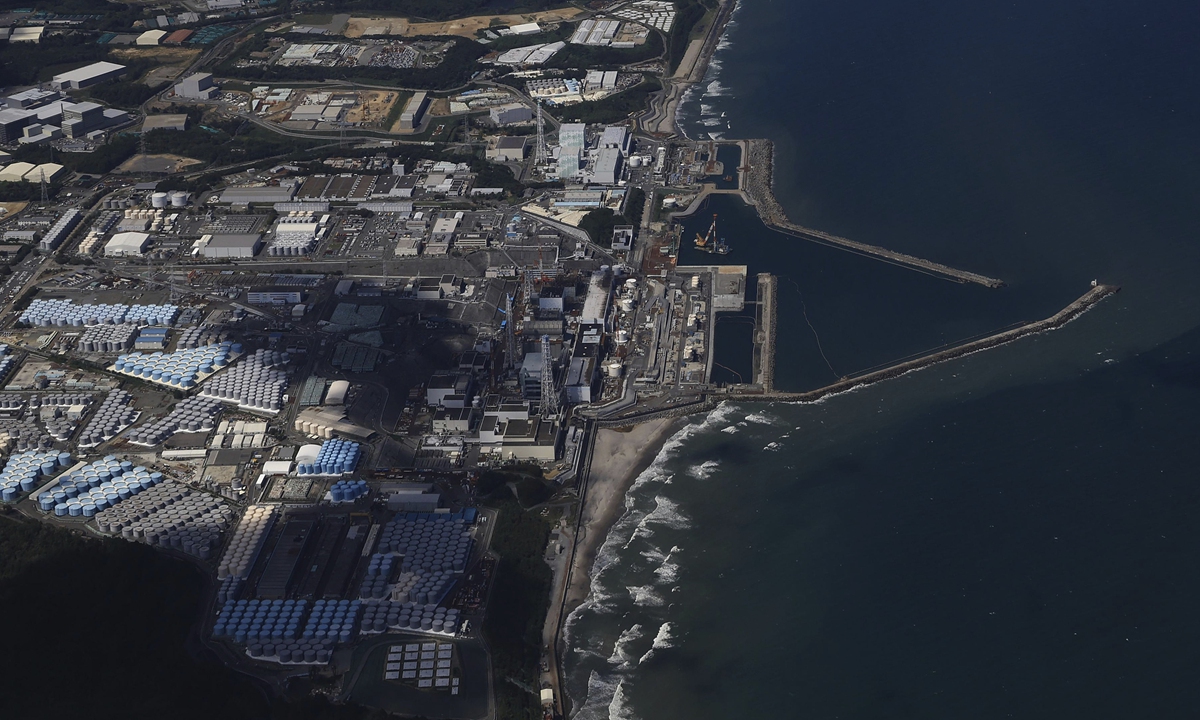
Japan starts dumping nuclear-contaminated wastewater into the ocean. Photo:VCG
Chinese authorities have strongly condemned the Japanese government's commencement of dumping Fukushima nuclear-contaminated wastewater into the ocean on Thursday, as the Chinese Foreign Ministry made serious demarches to Japan and urged it to not move ahead with the plan while Chinese customs has suspended all aquatic product imports from the country.
In disregard of the strong criticism and opposition from the international community, the Japanese government unilaterally started the dumping of the Fukushima nuclear-contaminated wastewater into the ocean 1pm local time on Thursday.
Chinese Foreign Ministry Spokesperson Wang Wenbin said that the disposal of the Fukushima nuclear-contaminated water is a major issue about nuclear safety. Its impact goes beyond Japan's borders, and the issue is by no means a private matter for Japan. Since humanity began using nuclear energy for peaceful purposes, there has been neither any precedent nor universally recognized standards for discharging nuclear-contaminated water into the ocean.
The Fukushima nuclear accident which took place 12 years ago was a major catastrophe that already caused the leakage of large amounts of radioactive substances into the ocean. There could be a man-made secondary disaster to the local people and the whole world if Japan chooses to dump the water into the ocean just to serve Japan's selfish interests, Wang added.
The Japanese government failed to prove the legitimacy and legality of the ocean discharge decision, the long-term reliability of the purification facility, and the authenticity and accuracy of the nuclear-contaminated water data. It failed to prove that the ocean discharge is safe and harmless to the marine environment and people's health, and that the monitoring plan is sound and effective. Japan also failed to have thorough consultations with other stakeholders, said Wang.
The ocean belongs to all humanity. To forcibly start the ocean discharge is an extremely selfish and irresponsible act in disregard of the global public interest, Wang said. "By dumping the water into the ocean, Japan is spreading the risks to the rest of the world and passing an open wound onto the future generations of humanity," he said.
By doing so, Japan has turned itself into a saboteur of the ecological system and polluter of the global marine environment. It is infringing upon people's rights to health, development and a healthy environment, which violates Japan's moral responsibilities and obligations under international law. From the moment Japan started the discharge, it has put itself in the dock in front of the international community and is bound to face international condemnation for many years to come, the spokesperson warned.
"The Chinese government always puts our people's wellbeing first, and will take all measures necessary to safeguard food safety and the health of our people," Wang stressed.
Additionally, China's General Administration of Customs (GAC) said on Thursday that it is highly concerned over the risk of radioactive contamination from Japanese food and agricultural products exported to China. In order to prevent radioactive contaminated Japanese food from being exported to China and protect the lives and health of the people, the GAC has continued to assess the risk of radioactive contamination of Japanese food, and on the basis of strictly ensuring safety, has taken strengthened supervision measures on food imported from Japan.
Therefore, the GAC announced that China will halt all aquatic product imports from Japan starting from Thursday.
The GAC will continue to monitor the dumping of nuclear-contaminated wastewater, and dynamically adjust relevant regulatory measures according to the situation to prevent risks to the health and food safety of Chinese people.
In July 2023 alone, China imported 234.51 million yuan ($32.24 million) worth of Japanese aquatic products, down 29 percent year-on-year, according to Chinese customs data.
The relevant departments are organizing the marine radiation environment monitoring of China's jurisdictional sea areas in 2023, following Japan's dumping of nuclear-contaminated water, said the National Nuclear Safety Administration of China's Ministry of Ecology and Environment (MEE) on Thursday.
The MEE stated that it was extremely selfish and irresponsible of the Japanese government to force the discharge of the nuclear-contaminated wastewater, prioritizing its own self-interest over the long-term well-being of all mankind.
Global Times
